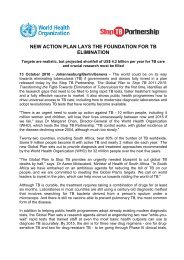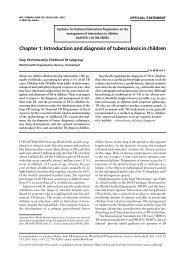Thailand - Stop TB Partnership
Thailand - Stop TB Partnership
Thailand - Stop TB Partnership
Create successful ePaper yourself
Turn your PDF publications into a flip-book with our unique Google optimized e-Paper software.
Staffing<br />
Health care reforms resulted in a reduced budget for the NTP and in lower levels of health<br />
staffing. As a result, remaining health workers are required to shoulder a heavier burden<br />
of responsibilities without a corresponding increase in salary. Budget reductions have also<br />
meant a reduction in training opportunities and other incentives. To address these problems,<br />
the NTP has developed a comprehensive human resource development plan, but the<br />
identification of funding to ensure implementation has been a challenge.<br />
Staff reductions have had a dramatic impact on the capacity of many regional <strong>TB</strong><br />
offices, and on the workloads of those who kept their jobs. As one regional <strong>TB</strong> director<br />
commented, “Individuals have too many different jobs to handle. No one is dedicated to<br />
<strong>TB</strong>, and with other acute diseases to deal with, such as avian flu, people tend to think that<br />
<strong>TB</strong> can wait.” 115 Training courses and supervision and monitoring meetings are now held<br />
only once a year, often in conjunction with training for other health programs to minimize<br />
costs. 116 Moreover, many health care workers believe that working with <strong>TB</strong> patients is a “high<br />
risk, unattractive job,” 117 which leaves them more vulnerable to <strong>TB</strong> infection. 118 (In fact, one<br />
research study in a Chiangrai hospital detected an increased risk of <strong>TB</strong> infection for health<br />
care workers. 119 ) This combination of perceived (and real) risk, heavy workload, and inadequate<br />
compensation has resulted in low morale and high turnover rates among <strong>TB</strong> clinical<br />
staff. In particular, the NTP’s inability to offer a higher salary or other incentives has led to<br />
an increasing number of health workers who transfer to other health departments. 120<br />
The initiative to offer DOT through village health volunteers and family members<br />
was one attempt to respond to the staffing shortage. In addition to administering DOT,<br />
village health volunteers are expected to provide a wide range of primary health services,<br />
including <strong>TB</strong> education, in return for free medical care. Family volunteers do not receive<br />
even this level of compensation. Some village health volunteers report that they find their<br />
jobs are unappealing, 121 and others think that the level of responsibility and the heavy workload<br />
attached to providing community and patient education is too demanding to be undertaken<br />
by volunteers. 122 Many health administrators agree that village health volunteers “need<br />
to be supported and salaried. We can’t make them work for free all the time.” 123<br />
According to one recent study, the practice of DOT is quite different from the<br />
theory. Health personnel were more likely to observe DOT according to guidelines than<br />
other types of observers, but less likely to remain in their positions long-term. To improve<br />
accessibility to DOT services, the NTP needs to develop better strategies for motivating<br />
health personnel to remain dedicated to <strong>TB</strong> work and to devise additional measures to provide<br />
training and support to village health volunteers and family members. 124<br />
Human resource capacity could also be improved by encouraging medical and<br />
nursing schools to include or expand coverage of <strong>TB</strong> care and treatment issues in their<br />
56<br />
<strong>TB</strong> POLICY IN THAILAND







![Global Drug Facility Annual Report 2011 [.pdf] - Stop TB Partnership](https://img.yumpu.com/26788745/1/184x260/global-drug-facility-annual-report-2011-pdf-stop-tb-partnership.jpg?quality=85)

![Concept note on national stop TB partnership [.pdf]](https://img.yumpu.com/26788741/1/184x260/concept-note-on-national-stop-tb-partnership-pdf.jpg?quality=85)



![2005 and Challenges for 2006 - 2015 [.pdf] - Stop TB Partnership](https://img.yumpu.com/26788674/1/190x245/2005-and-challenges-for-2006-2015-pdf-stop-tb-partnership.jpg?quality=85)
![Brochure (French) [.pdf] - Stop TB Partnership](https://img.yumpu.com/17234792/1/190x91/brochure-french-pdf-stop-tb-partnership.jpg?quality=85)

